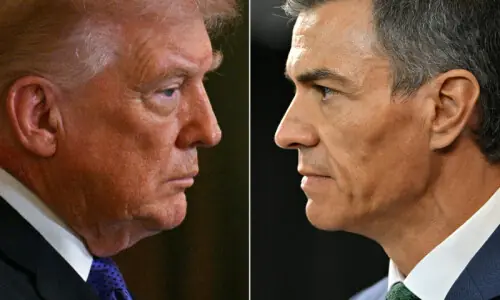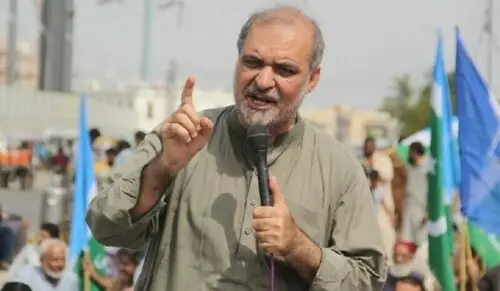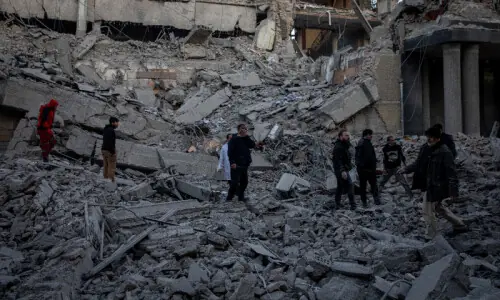
IT was sad to witness the humiliation of Pakistan’s adviser on foreign affairs, Sartaj Aziz, by his Indian hosts and the Afghan president in Amritsar. Mr Aziz is one of Pakistan’s elder statesmen. His treatment at the so-called Heart of Asia Conference by India is yet another example of the brutish nature of the ruling regime in New Delhi.
The conference was misused by India, the rotational host, to promote its single agenda of portraying Pakistan as a ‘terrorist’ state in order to ‘isolate’ it. The Indian prime minister played a duet with Afghan President Ghani, the ostensible beneficiary of the conference, who launched an aggressive indictment of Pakistan for alleged support to the Taliban insurgency in Afghanistan; interrogated the Pakistan delegation leader from the floor of the conference; and rejected Pakistan’s offer of $500 million in economic assistance. To add injury to insult, the Indians barred the Pakistan leader from meeting the media and even from leaving his hotel.
The mystery is why the Pakistan government chose to expose its most senior diplomat to the hostility and insults which should have been expected from India and Afghanistan’s president. Since India scuttled the Saarc summit in Islamabad, Pakistan could have reciprocated by refusing to attend the Amritsar conference and persuading its close friends, China and Turkey, from doing so. At the very least, Pakistan’s representation should have been at a low level.
At a Non-Aligned Summit a few decades ago, Egypt’s foreign minister interrupted the president of the host country when he made a critical comment about the recently concluded Camp David agreement. In Amritsar, Pakistan would have been well within its rights to interrupt the speeches by Modi and Ghani, on a point of order, for transgressing the agenda and purpose of the conference. If its protest was ignored, the delegation should have walked out of the conference. At the very least, Pakistan could have countered with its own accusations against India and Afghanistan.
Instead, by all accounts, Mr Aziz sat through Modi’s attack and Ghani’s interrogation. He even called subsequently on the Afghan president.
In Amritsar, Pakistan would have been well within its rights to interrupt the speeches by Modi and Ghani.
Mr Aziz’s display of self-restraint is no doubt admirable. But the Indian and Afghan insults were not merely to his person; these were insults to the national dignity of Pakistan and, as such, they ought not to have been tolerated. According to diplomatic norms, such insults are expected to evoke a strong response. It is unclear if formal protests have been lodged with the two governments.
A failure to respond strongly to such insults to our country not only signifies a lack of national self-respect, it implies tacit acceptance of the serious allegations advanced against Pakistan.
Unfortunately, this is not the first time that Pakistan’s diplomacy has failed to anticipate events and avoid political traps and reversals. For instance, Pakistan should have postponed the Saarc summit, anticipating India’s effort to scupper it. Instead, Islamabad waited in the vain hope that Modi would magnanimously grace the summit, resulting in the humiliation not only of Indian withdrawal from the conference but also the regrets of most the other South Asian states, no doubt under heavy pressure from India.
Pakistan’s timorous and ingratiating posture in external relations, especially towards India, has become a recurring feature of its high-level diplomacy, symbolised by the desperate calls for dialogue with India, even after it launched its latest repression in India-held Kashmir last July.
Pakistan has also sustained, with little complaint, the repeated intemperate accusations from Afghanistan, a nation whose millions of refugees we still continue to host, whose goods are allowed to transit our territory, including its exports to India, whose civil wars have brought terrorism to our country and for whom Pakistan has made persistent efforts for internal peace and reconciliation, even as its intelligence agencies collaborate with India to foment TTP terrorism and Baloch insurgency.
The question arises: what is the purpose of this patience with punishment? There could be several answers:
Islamabad may expect that one day India and Afghanistan will see reason and reciprocate Pakistan’s quest for dialogue and compromise. I would not hold my breath.
There may be an expectation that an accommodative stance will elicit understanding and support from Kabul’s patron and India’s new ally, the US. But Indian and Afghan allegations against Pakistan are being echoed if not originated in Washington.
There may be fear that a more robust stance could evoke American sanctions. But sanctions will be avoided only if the US believes that the cost of imposing these on Pakistan outweighs any possible benefit.
There may be a desire not to provoke India into committing cross-border aggression against Pakistan. Again, aggression can be avoided only if India (and other powers) are convinced that its cost will be unacceptable.
Or there may unknown reasons that compel our rulers to suffer Modi and Ghani’s slings and arrows without flinching.
History teaches that weakness invites aggression. Timidity will invite further abuse and pressure. Pakistan must adopt a more robust posture in defence of our national interests.
Following Amritsar, Pakistan should strictly limit the activities and access of Indian diplomats in Pakistan; designate the Bharatiya Janata Party and the Rashtriya Swayamsevak Sangh as ‘terrorist’ organisations; provide finance to the Kashmiri Hurriyat Conference for humanitarian and material support to the Kashmiri victims of Indian repression.
Pakistan should also formally approach the Security Council to: investigate and condemn India’s human rights violations in Kashmir; call for a halt to Indian violations of the LoC ceasefire; and agree on steps to implement the Security Council resolutions on Jammu and Kashmiri.
The screws can be turned harder against Afghanistan. Pakistan can accelerate Afghan refugee repatriation; slow the transit of Afghan goods and halt their transit to India; fence the border as planned and strictly limit cross-border traffic.
The Afghan and Indian sponsorship of the TTP and its links with the militant Islamic State group should be actively projected in world capitals and the media. If US-Nato forces in Afghanistan do not terminate the TTP’s safe havens in Afghanistan by a specific date, Pakistan must consider direct action to do so. Eliminating the threat on the western border will enhance Pakistan’s ability to face the more enduring threat in the east.
The writer is a former Pakistan ambassador to the UN.
Published in Dawn December 11th, 2016




























